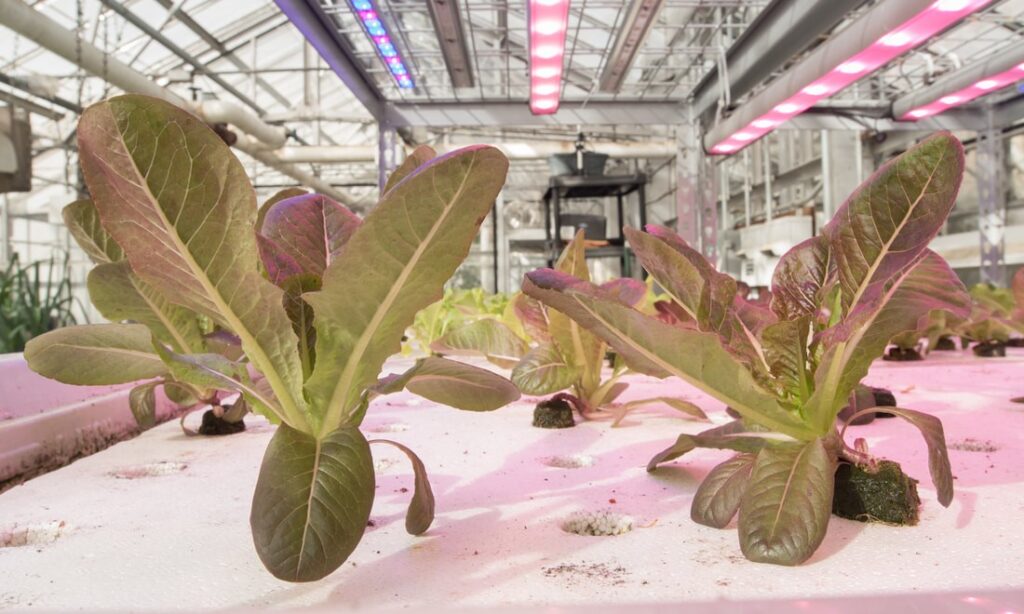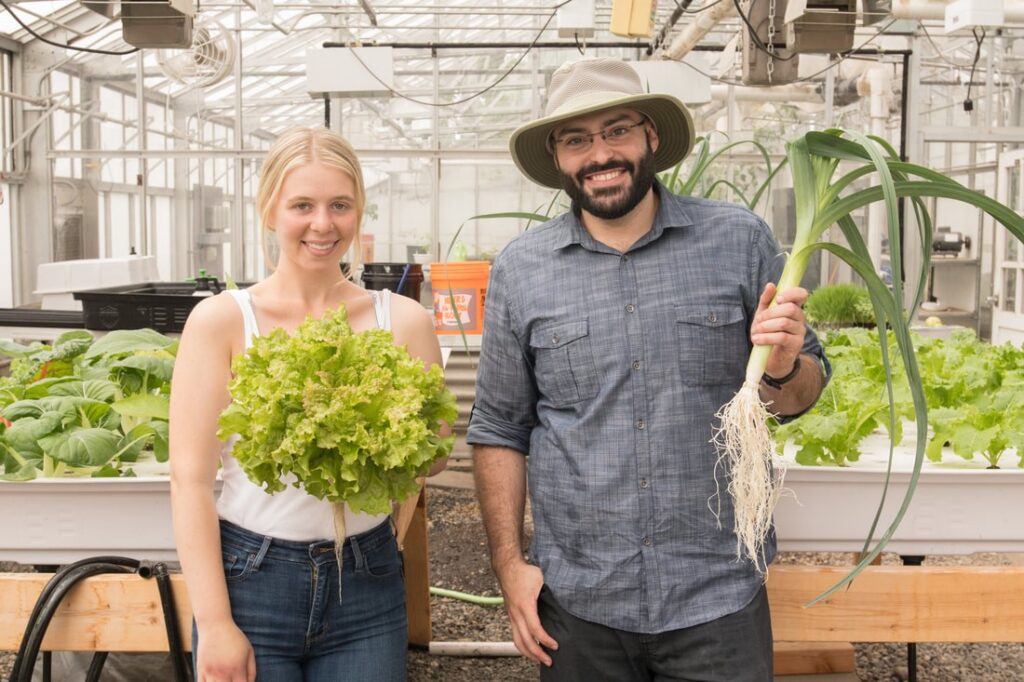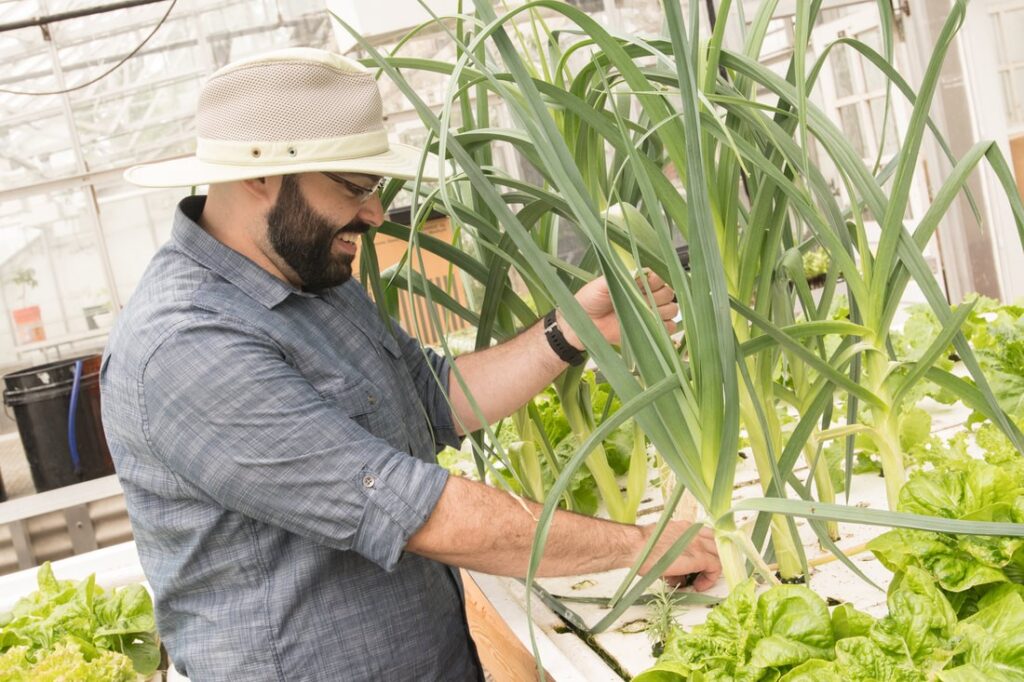
Leafy greens growing in the UMass Hydroponics Farm greenhouse.
UMass Hydroponics Farm is a student-run hydroponics business located on campus that grows leafy greens, culinary herbs, tomatoes, bok choy, leeks, and strawberries for Franklin Dining Commons and the UMass community as a whole. UMass Hydro was founded about a year ago by Evan Chakrin, studying Horticulture, and Sustainable Food and Farming student Dana Lucas. “We wanted to have a chance while in school at Stockbridge to have hands on hydroponic experience using common production systems and growing actual food,” says Evan Chakrin.
Right now, UMass Hydro is supplying greens to on-campus student-run business Greeno Sub Shop and will begin regular deliveries to Franklin Dining Commons and the Belly of the Beast in Northampton this semester. They will also be launching a small Community Supported Agriculture (CSA) share around March 1st and will be selling their produce at the returning UMass Student Farmers’ Market this Spring. Because of their small scale, UMass Hydro cannot provide all of the calories that people need, “but we can supplement what they are eating with the highest quality produce that is possible to be grown,” says Evan.

Dana Lucas (left) and Evan Chakrin (right) holding beautiful and freshly harvested UMass Hydro produce.
Hydroponics is a very important innovation for farming because it is extremely portable, resource efficient, and customizable for any location. UMass Hydro has eliminated pest pressure, the need to weed their crops, and the need to attend to soil fertility and health. The adaptability of the technology also allows hydroponics to potentially increase food security. “You can set it up in a desert, in a city, on a rooftop, or in a shipping container without the need to deal with tons of soil. It is a very portable and efficient way to grow food,” Evan shares. Hydroponics uses only 10% of the water that traditional farming requires to grow the same types of crops. Evan explains that, “hydroponics will never replace field agriculture for root or grain crops, but for delicate crops and small fruit crops it is perfect.” Dana Lucas shares that “Massachusetts grows only 4% of their food and 80% of the cost of produce is transportation.” Dana explains that to run one freight container of hydroponics for one year takes the same amount of energy to drive one truck load of produce from California to Massachusetts. Hydroponics may become an essential part of the solution to food insecurity and the increasing pressures of climate change on food production.
Another unique and sustainable benefit of UMass Hydro and other indoor farms is their capability to grow food year-round. “We have been growing lettuce, basil, and tomatoes all winter,” says Evan. Even in the middle of January, students can look out the windows of Franklin Dining Commons to see the food they are eating being grown in the purple-lit greenhouses of UMass Hydro. Evan shares that he loves “being with the plants in the winter under the light and in the heat of the greenhouse. When it’s cold and the ground is frozen and nothing is growing outside we can come in here with lights that have the orange glow of the sun.”
This spring, UMass Hydro is expanding using a grant that they received from the Sustainability, Innovation and Engagement Fund (SIEF). They are building four new lettuce raft tables to double their growing space and will also begin experimenting with aquaponics. This is a combination of aquaculture and hydroponics, and they will be raising koi fish and growing plants together in an integrated system. The only inputs to the system will be fish food and water. The UMass Hydro project was started using a grant from the University as well, and Evan shares that “if you’re really ambitious, do a lot of work, and write decent grant proposals, there are a lot of opportunities at UMass that are not advertised.”
Arguably the most impactful and important aspect of UMass Hydro is the educational opportunity that it provides UMass students. In fact, UMass Hydro is the only year-round indoor food production system that they can be a part of on campus. Mia Cogliano, a Sustainable Food and Farming senior at UMass, works in the UMass Hydro greenhouse. She shared that she has learned about growing and identifying vegetables, cloning plants, managing pests, and building hydroponic equipment. Mia explains, “I didn’t even know what hydroponics was when I started. I was with Evan all of the time and that is one of the reasons I stayed. He taught me so much and any question I could ask he would answer it.” Mia describes the UMass Hydro greenhouse as her “happy place” and points out that “you can get really cheap lettuce here and it is really fresh. You can literally come by any time and choose which one you want. I don’t think it gets fresher than that.” UMass Hydro takes pride in its unique and exceptional ability to provide an unparalleled opportunity for students to gain access to fresh produce and hands-on experience with hydroponic growing systems.

Evan Chakrin harvesting a leek.
A huge thanks to Evan, Mia and Dana for speaking with us for this interview, and to the entire UMass Hydro team for all of their hard work to provide fresh food and unique educational opportunities to the students of UMass Amherst. Follow their Facebook Page for information and updates or email [email protected] if you are interested in purchasing a CSA share, getting credit for working in the greenhouse, or buying their produce!
Photo credit: Keith Toffling Photography
